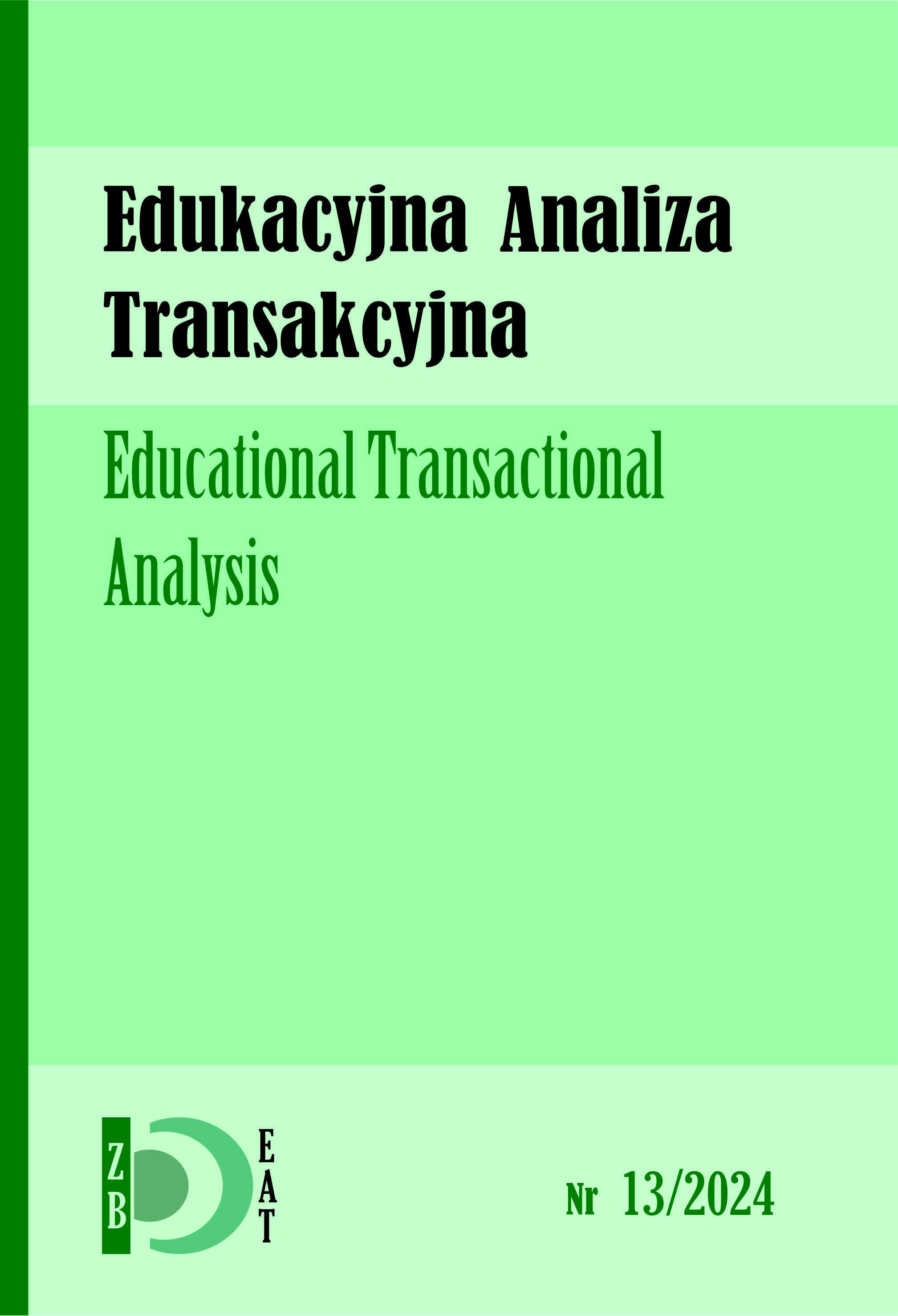Preventive and educational support for students with special educational needs in an inclusive education as perceived by teachers
DOI:
https://doi.org/10.16926/eat.2024.13.23Keywords:
educational and preventive support, behavioural problems, disabled students, inclusive education.Abstract
The aim of the research was to collect the opinions of teachers teaching in grades I-III of public primary schools about the educational and preventive support forms, methods and techniques implemented in schools and its effectiveness in preventing and eliminating inappropriate behaviour of disabled and non-disabled students.
Empirical material was collected using Questionnaire for Teachers: Educational and preventive support in inclusive education and involved 62 teachers working in public primary schools in the Lublin Voivodeship.
The research indicated which, according to teachers, educational and preventive activities implemented in schools are appropriate in working with students, as well as which forms of support are the least and most effective in educational work with non-disabled children and their disabled peers.
Downloads
References
Aiello, P., & Sharma, U. (2018). Improving intentions to teach in inclusive classrooms: The impact of teacher education courses on future learning support teachers. Form@re - Open Journal per la formazione in rete, 18(1), 207–219. https://doi.org/10.13128/formare-22605
Borowik, J. (2018). Działania wychowawczo-profilaktyczne a diagnoza potrzeb środowiska szkolnego. ORE.
Brudnik, E. (2012). Projekt edukacyjny. In B. Woynarowska (Ed.), Edukacja zdrowotna. Porad-nik dla nauczycieli wychowania fizycznego w gimnazjach i szkołach ponadgimnazjal-nych (pp. 41–55). Wydawnictwo Pedagogiczne ZNP.
Całek, G. (2021). Szkolne programy wychowawczo-profilaktyczne – idea a rzec-zywistość. Resocjalizacja Polska. Polish Journal of Social Rehabilitation, 22, 451–464. https://doi.org/10.22432/rp.411
Cęcelek, G. (2020). Specyfika przywództwa edukacyjnego w szkole oraz jej otoczeniu. Kultura i Wychowanie, 1(17), 127–140. https://doi.org/10.25312/2083-2923.17/2020_09gc
Chałupniak, R. (2014). Wychowanie w szkole: od bezradności ku możliwościom. Wydawnic-two Uniwersytetu Opolskiego.
Charland, W. (2006). The art association/higher education partnership: Implementing resi-dential professional development. Arts Education Policy Review, 107(6), 31–39. https://doi.org/10.3200/AEPR.107.6.31-39
Dumitru, G. (2023). Professional behavior of the teacher that can be improved through train-ing programs. In 9th International Conference Edu World 2022 Education Facing Con-temporary World Issues. European Proceed-ings. https://doi.org/10.15405/epes.23045.21
Elias, M. J., & Weissberg, R. P. (2000). Primary prevention: Educational approaches to en-hance social and emotional learning. Journal of School Health, 70(5), 186–190. https://doi.org/10.1111/j.1746-1561.2000.tb06470.x
Gaś, Z. (2001). Doskonalący się nauczyciel. Wydawnictwo UMCS.
Gaś, Z. (2006). Psychoprofilaktyka w szkole. Wydawnictwa Szkolne i Pedagogiczne.
Kausar, F. N., Shah, M. U., & Ghazala, N. (2023). Students’ undesirable behaviour faced by teachers in classroom management at secondary level. Journal of Research Admin-istration, 5(1), 175–198.
Kretlow, A. G., Cooke, N. L., & Wood, C. L. (2011). Using in-service and coaching to increase teachers’ accurate use of research-based strategies. Remedial and Special Education, 33(6), 348–361. https://doi.org/10.1177/0741932510395397
Kunowski, J. (2005). Trudności wychowawcze we współczesnej rzeczywistości społecznej. In T. Sołtysiak (Ed.), Zagrożenia w wychowaniu i socjalizacji młodzieży oraz możliwości ich przezwyciężania (pp. 17–26). Wydawnictwo Akademii Bydgoskiej.
Okoń, W. (2007). Nowy słownik pedagogiczny. Wydawnictwo Akademickie „Żak”.
Ostaszewski, K. (2019). Teoretyczne podstawy profilaktyki szkolnej. In R. Porzak (Ed.), Profilaktyka w szkole. Stan i rekomendacje dla systemu oddziaływań profilak-tycznych w Polsce. Fundacja „Masz Szansę”.
Paramita, P. P., Anderson, A., & Sharma, U. (2020). Effective teacher professional learning on classroom behaviour management: A review of literature. Australian Journal of Teacher Education, 45(1). https://ro.ecu.edu.au/ajte/vol45/iss1/5
Piorunek, M., & Werner, I. (2014). Wychowawca wsparciem dla ucznia? Relacje uczeń – wy-chowawca w percepcji gimnazjalistów. Studia Edukacyjne, 32, 99–122. https://doi.org/10.14746/se.2014.32.7
Tabacaru Dumitru, C., Chirlesan, G., Stinga, V., & Constantinescu, M. (2022). School-wide positive behaviour support as preventive framework to reduce disruptive behaviours: A cross-sectional study. Revista de Cercetare si Interventie Sociala, 79, 164–180. http://doi.org/10.33788/rcis.79.11
Więckiewicz, B. (2023). Problemy ucznia w szkole i alternatywne koncepcje edukacji. KUL-TURA – PRZEMIANY – EDUKACJA, 12, 315–328. https://doi.org/10.15584/kpe.2023.12.19
Wosik-Kowala, D. (2018). Uwarunkowania skuteczności procesu wychowania w środowisku szkolnym. Annales Universitatis Mariae Curie-Skłodowska sectio J – Paedagogia-Psychologia, 31(3), 9–21. http://dx.doi.org/10.17951/j.2018.31.3.9-21
Wosik-Kowala, D. (2019). Szkoła miejscem (nie)bezpiecznym – perspektywa ucznia. Annales Universitatis Mariae Curie-Skłodowska sectio J – Paedagogia-Psychologia, 32(3), 83–96. https://doi.org/10.17951/j.2019.32.3.83-96
Zezulková, E., Janků, K., Pipeková, J., & Viktorin, J. (2023). Selected aspects of elementary schools' approaches to the primary prevention of pupils' risky behavior. In INTED2023 Proceedings (pp. 1651–1657). IATED. https://doi.org/10.21125/inted.2023.0464
Downloads
Published
How to Cite
Issue
Section
License
Copyright (c) 2024 Magdalena Wójcik

This work is licensed under a Creative Commons Attribution 4.0 International License.
I am aware that the Educational Transactional Analysis journal is published under a Creative Commons license - Attribution (https://creativecommons.org/licenses/by/4.0/legalcode).
By submitting the article, I agree to make it available under this license

